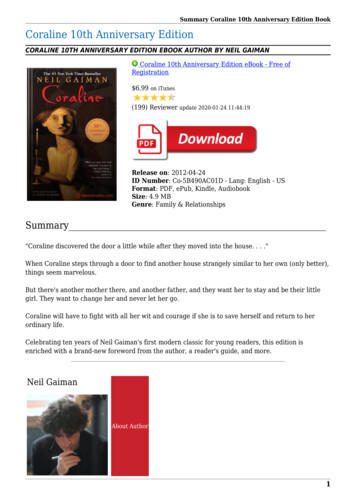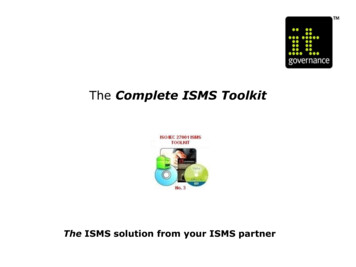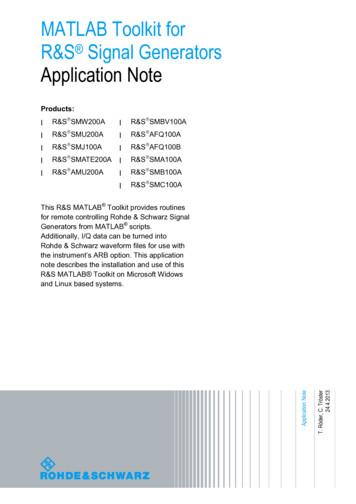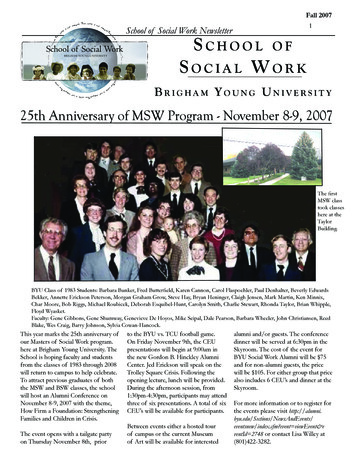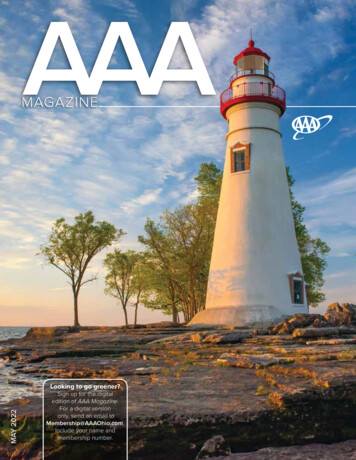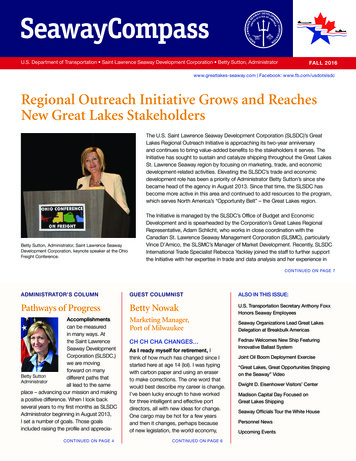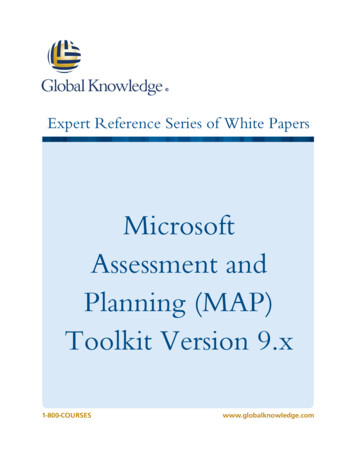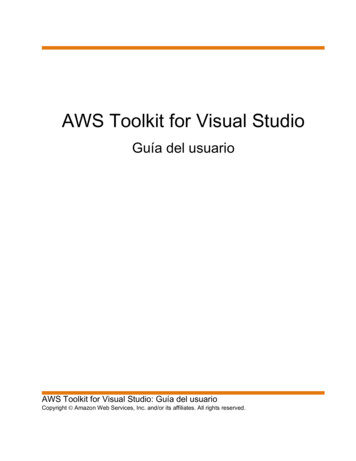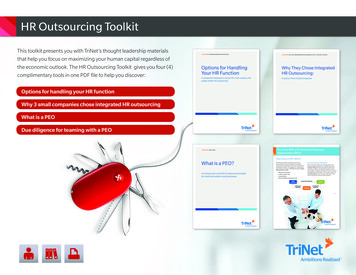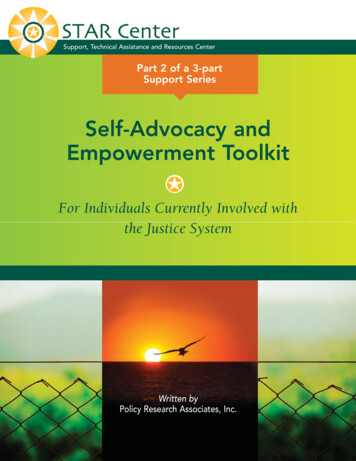
Transcription
60TH ANNIVERSARY TOOLKITFOR COMMUNICATIONS & MARKETING COMMITTEE
ContentsBRAND OVERVIEW 5MissionVisionUnique Value PropositionValuesBrand PromiseElevator PitchBoilerplateAWF KEY MESSAGES 9VISION 2020-2030 TALKING POINTS 11FAQS 1360TH THEMES 15African LeadershipLandscape ConservationCommunity Ownership and EngagementSpecies ProtectionAWF HISTORY AT A GLANCE 2160TH ANNIVERSARY TOOLKIT3
Brand OverviewMISSIONVISIONUNIQUE VALUE PROPOSITIONTo ensure wildlife and wildlands thrive in modern AfricaAn Africa where human development includes thriving wildlife and wild lands ascultural and economic assets for Africa’s future generations Holistic approach and focus: Multifaceted and pragmatic conservation strategiesdeliver a positive impact for people, wildlife, and wild lands. Deep history in Africa: Six decades on the continent gives AWF expertise inaddressing the unique challenges facing the continent as well as the ability to drawon deep relationships with communities, the private sector, and local and nationalgovernment authorities. For Africa, by Africans: Renowned, trusted conservation organization that focusesexclusively on Africa, developing African-owned and led conservation solutions. Global Reach: AWF engages key global audiences in Africa’s conservation agenda,ensuring global interests in Africa understand and incorporate Africa’s conservationand development priorities.VALUES Africans and African Leadership Partnership Empowerment Innovation Balance Empathy60TH ANNIVERSARY TOOLKIT5
Brand Overview (contd.)BRAND PROMISEAWF delivers resilient conservation solutions that sustain human well-being, wildlife,and the ecosystems on which we all depend, and are driven by Africans’ aspirations foreconomic, cultural, and social development.We are authentic and bold, leaning into hard conversations at all levels, giving voice tothe perspectives rooted in the lived realities of the people in modern Africa and of thepeople who live with the consequences of conservation interventions.ELEVATOR PITCHAWF is Africa’s global conservation organization focused solely on African wildlifeand wildlands. AWF is African-led, addressing local, national, and global threats likepoaching, habitat loss, unsustainable development, and the illegal wildlife trade.We do this at all levels across the continent, developing resilient wildlife economiesbenefiting communities and contributing to national economies.BOILERPLATEThe African Wildlife Foundation is the primary advocate for the protection of wildlifeand wild lands as an essential part of a modern and prosperous Africa. Founded in1961 to focus on Africa’s conservation needs, we articulate a uniquely African vision,bridge science, and public policy, and demonstrate the benefits of conservation toensure the survival of the continent’s wildlife and wild lands.60TH ANNIVERSARY TOOLKIT7
AWF Key Messages AWF was founded to address Africa’s unique conservation challenges andopportunities with a focus on building African conservation leadership — becausefor conservation approaches to be sustainable they must be locally led. AWF is a citizen of Africa, and we are committed to promoting, developing, andimplementing African-led conservation. Whether supporting the education of future conservationists, fighting the illegalwildlife trade, or implementing holistic conservation programs in large landscapes,AWF has continually been a pioneer and innovator in African conservation. We are building on that legacy to achieve conservation success amid rapid andprofound changes in Africa today. The future of Africa’s wildlife and wild lands hinges on linking conservation tothe aspirations of Africa’s people, ensuring they have agency over their naturalresources. We are fighting to ensure African perspectives and voices are at the table globally toinform their own development and conservation agendas. With the reality of ever-increasing pressure on resources, AWF’s large landscapeconservation approach is becoming even more critical — as is the need tosimultaneously engage at the national and global level to keep conservationcentered in economic and development agendas. The COVID-19 pandemic, while devastating, confirmed the wisdom and foresight ofAWF’s 10-year strategic vision. Now more than ever, the world is aware of the needto build long-term resilience for people, wildlife, and wild lands, to end mindlessexploitation of natural resources, and to ensure that nature is a cornerstone ofdevelopment planning. At all times and irrespective of gender, race, sexual orientation, age, or class, AWFtakes a human rights-based conservation approach.60TH ANNIVERSARY TOOLKIT9
Vision 2020-2030 Talking Points Development and nature, not development or nature. We develop sustainable land-use plans with We build African capacity and leadership. This We work with governments and global leaders. WeAWF knows development is inevitable, but we also knowthat unsustainable development is not. All major threatsto wildlife conservation in Africa are ultimately drivenby a false choice between the wellbeing of people or ofwildlife. AWF’s solutions center on a future where natureis integral to human wellbeing, including economically —and our strategic vision will get us there.strategy includes AWF’s core work in training, enterprisedevelopment, and capacity building for our relevanttarget audiences in each landscape. We employ cutting-edge research and thoughtleadership. We seek to establish wildlife as competitiveland use and use AWF’s platform to document whatworks, what does not, and why. We amplify African voices for conservation. We willbuild from AWF’s communications, networking, andleadership strengths to amplify African voices. We promote entrepreneurial conservation andinnovative technology enterprises. Through regionalprivate sector, entrepreneurial, or emerging technologypartners, we will be able to provide access to or developprojects that support African leadership, communitydevelopment opportunities, women and youth inconservation enterprises. We invest in children and youth. Before we can buildcommunities. Bringing the right people together formutually beneficial results is core to this strategy.Through engagement with government agenciesresponsible for development and land use planning,we will offer support and ensure AWF is included in theplanning process to bring the best option for wildlife anddevelopment.engage government agencies through bilateral meetingsand public sessions to prioritize opportunities, concerns,and challenges in creating revenue and viability fromwildlife-based activities. We support protected areas management.Support conducive policy through technical supportto policymakers, develop viable context-specificconservancy models. We assist governments withspecies-action planning and implementation. Thisstrategy forms the core of our species-specific workand ensures that species plans and strategies are basedon the best available science and are integrated withregional development. We are fighting the illegal wildlife trade. We arededicated to ending wildlife trade. AWF’s strategyis focused on each stage of wildlife trafficking, fromdecreasing the opportunities for wildlife traffickingthrough improving detection and increasingprosecutorial capacity, to reducing demand in targetcountries.the next generation of leaders, we need to ensure thatchildren are inspired and engaged in our work. ThroughClassroom Africa and partnering with existing wildlifeclubs we will support the existing education system inbringing wildlife, wildlands, and development knowledgeto primary school children.60TH ANNIVERSARY TOOLKIT11
FAQsThis is where we need your help. What questions do you get? What do you need helpanswering? We’d like to spend some time brainstorming during our meeting. What is the significance of your 60th year?At the current rapid pace of development, we stand to lose Africa’s wildlife and wildlands. AWF believes that these next 10 years will determine if conservation on thecontinent succeeds or fails over the long run, and, because the richness of Africa’sbiodiversity global systems depend on Africa’s success.However, we know that for conservation to succeed it needs to be done differently— the continent must present a united voice on the global stage.As we enter our 60th year, in alignment with our vision, we intend to use thisanniversary to celebrate past success, as well as, put the spotlight on the severity ofcurrent threats and our solutions to protect wildlife and wild lands for the future. What have you accomplished/learned?It is AWF’s conviction that the future of wildlife and wild lands in Africa hingeslargely on one factor: linking the conservation agenda in meaningful ways to theaspirations and mindsets of the African people. To achieve the synergies andmutual benefits we desire, we must ensure a diversity of African leaders (young andestablished, official and grassroots, government and private sector, women andmen) are at the table to help create an ambitious conservation agenda. We musthelp ensure a larger proportion of Africans, particularly young people, becomepassionate about wildlife and wild lands conservation and make decisions whichreflect that passion. What makes AWF different? Why should I support you over WWF, APF, Tusk, etc?As an African organization that is truly global in reach, with a long, successful historyand a renewed and deepened commitment to African conservation leadershipand the development of diverse wildlife economies, AWF is the only organizationpositioned to lead the way in a post-COVID world and ensure the continent’seconomic and development goals are sustainable and aligned with the wellbeing ofits people and nature. We are becoming a trusted partner to Africa and globally tohelp define a new path forward for wildlife and people. African leadership appears to be central to your history and strategic plan movingforward. Why?Africa is rapidly growing and transforming, but conservation has not kept up withthis growth.If the development and economic decisions being made at national, regional, andglobal levels to fuel this growth do not integrate conservation then we stand tolose Africa’s rich biodiversity — regardless of the work on the ground. Increasingly,60TH ANNIVERSARY TOOLKIT13
14
FAQs (contd.)African leaders are driving these decisions. So, as is the case on every othercontinent, it is time Africa’s leaders are driving conservation in Africa.A deep understanding of and connection with the aspirations and mindsets drivingchange on the continent is essential for conservation success.AWF is the only organization focused on the continent that is working both on theground and also unifying African voices at all levels to provide a platform for Africato thoughtfully conserve our wildlife and wild lands in a manner that sustainablygenerates value and opportunities for Africa’s people, resulting in thriving wildlifepopulations, secured habitats, and an increased quality of life for people that isembedded in the change dynamics shaping the continent. Who is your CEO?Kaddu Sebunya is AWF’s CEO and primary spokesperson. He oversees AWF strategyand works with global governments, the African Union, private sector, internationalorganizations, and civil society to raise awareness and understanding of the role ofecosystems, wildlife and wildlands in socio-economic development.Kaddu is a veteran conservationist with experience in sustainable resourcemanagement, government relations, strategy and international development,and he is passionate about inspiring leaders to implement policies that empowercommunities to create wealth for long-term economic and political stability as wellas sustainable development. How can I get involved? Where is investment needed most?AWF employs a suite of strategies to ensure the survival of Africa’s wildlife and wildlands as part of a thriving, modern Africa — so there’s space for you to get involvedin a program that best aligns with your philanthropic goals. We work at all levels,from the landscape to the global stage, to protect the continent’s natural assets,including deploying boots on the ground to stop poaching, engaging the continent’syouth leaders to become advocates for their natural heritage, working with Africangovernments to develop one unified vision and voice to ensure the continent’s rapiddevelopment integrates nature, raising global awareness of African conservation,and much more. Our priority needs include a diverse set of key programs that willmake the most impactful contribution to conservation60TH ANNIVERSARY TOOLKIT15
60th ThemesAFRICAN LEADERSHIP The rapid changes characterizing modern Africa — investments in infrastructure,rapid urbanization, climate change, population growth, shifting demographics,etc. — necessitate new ways of thinking and planning for conservation anddevelopment, new partnerships and operating modes, and perhaps above all newleadership models. (Changing the way conservation is done to adapt to a rapidlychanging Africa.) While there are many indigenous conservation approaches and traditions,conservation in Africa was shaped and led from outside over the last century, oftenusing approaches that alienated people from nature. Historically, Africans realizedminimal returns from traditional conservation; thus, many came to regard it ashaving little value to their lives. The development of enduring conservation solutions must have at its core Africanownership. Ownership that resides with those who bear conservation’s real costsand benefits — communities living with wildlife, youth, protected-area authorities,governments (local, regional, and national), and others with claims to the naturalresource base, especially women. We seek to ensure these vested owners have opportunities to voice their interests,helping shape conversations, debates, and policy — especially in the global anddevelopment arenas — to help shape financing/strategies that center conservationpriorities. In addition, we facilitate partnerships between African leaders(conservation, business, development) and their external counterparts. Because ifAfrica’s leaders don’t seek conservation, conservation won’t happen. African conservation leadership and capacity building was our primary goal 60 yearsago as a pioneering conservation group in Africa (AWF in fact, was born amid Africa’sindependence movements). The focus on conservation leadership is in AWF’s DNA.After 60 years, this is what distinguishes AWF in African wildlife conservation: Ourpioneering vision of and commitment to building conservation leadership, ourlongevity, and our responsive and adaptive approach. Today, individuals who took advantage of AWF leadership-developmentopportunities (CLMP, scholarships, etc) are found in every sphere that touchesconservation and are our partners in conservation implementation, policydevelopment, and more (See “Individuals” bullet, below.)60TH ANNIVERSARY TOOLKIT17
60th Themes (contd.)LANDSCAPE CONSERVATION AWF pioneered the large-landscape conservation approach in the form of our“Heartlands” program in 1998, a milestone. We target cross-boundary areas ofexceptional natural value (OR sociological and ecological systems sufficient tosustain wildlife and people) for integrated interventions that include activitiessuch as land-use planning, sustainable enterprise development, and businessengagement to ensure agricultural growth and other development plans areconservation-compatible. (First to recognize the need for building out bothecologically and economically viable landscapes.) AWF was unique in the breadth of its criteria for choosing Heartlands. To identifylandscapes for our interventions, we not only assess ecological viability, we alsoassess economic and even cultural factors. Initially we focused on eight landscapeskey to sustaining a diversity of species. Today, we work in 16, with priorities linkedto focal countries’ conservation strategies. This is one of AWF’s major contributions to the conservation sphere: recognizingthat there must be a combination of ecological and economic viability over crossboundary areas of exceptional natural value. With the reality of climate change and ever-increasing pressure on resources, thisproven approach to managing large landscapes (including dispersal areas andecosystems where wildlife can adapt) is more critical than ever. Nature can bothmitigate climate change effects and provide greater resilience for wildlife andpeople, but it must be managed as a system. Our approach entails supporting protected-area authorities with park managementplanning and working with communities in intensive, participatory processes tomap rational, sustainable land use that encompasses wildlife needs and communitywell-being including livelihood planning.COMMUNITY OWNERSHIPAND ENGAGEMENT Ownership of conservation must rest with the people who ultimately bear the costsand/or reap the benefits of conservation. These stakeholders include communitiesliving with wildlife, youth — who will inherit the consequences (or rewards) of thecontinent’s development decisions, and women, who have a special role to play inconservation. African indigenous communities have a rich cultural (traditional and historical)connection to nature and an understanding of stewardship practices, which mustinform conservation solutions today.60TH ANNIVERSARY TOOLKIT19
60th Themes (contd.) AWF prioritizes engagement with youth and women because they are key drivers ofchange across Africa and make up the majority of the population on the continent.Without the buy-in of this significant demographic, the key decision-makers, andthe major consumers on the continent, we will not be successful. Engaging rural women in conservation solutions translate to improvementsacross sectors — increased food supply, improved health and economic security,innovation in forestry, better management of ecosystems. Likewise, when ruralwomen participate in conservation and land-use decision-making, resources aremore equitably distributed in communities. Partnerships are critical, as new partnerships generate fresh ideas, resources, andenergy. AWF was among the first to recognize that engaging with the private sectorcan be a plus for community-focused conservation. We pioneered co-ownership ofluxury eco-lodges, and communities have benefited. AWF has always been driven by the needs of communities. In 2020, we formalizedthis value with a comprehensive human-rights-based policy that is built on theindustry gold standard.SPECIES PROTECTION We serve as the primary advocate for Africa’s wildlife, ensuring its right to thrive inmodern Africa (through a model that emphasizes African leadership, landscapescale conservation, etc). We say it often, but it is always worth repeating: “Conservation versusdevelopment” is a superficial argument / false choice, and wildlife plays an integralrole in Africa’s overall success and well-being. Counter-trafficking: AWF’s strategy focuses on each stage of wildlife trafficking,from deterring poaching to anti-trafficking through contraband detection andstrengthening prosecutorial capacity, to reducing demand in target countries. Wildlife can be the center of competitive land use for a variety of activities, linkingthe well-being of wildlife/ecosystems and communities. (Reference communitiessection above for examples we can cite.) 60TH ANNIVERSARY TOOLKITThrough the development of conservancies and other wildlife-based activities,communities can diversify their economies and become more resilient to climatechange and other challenges. As well, successful co-planning with communitiesensures that people and wildlife have safe space to live, mitigating the disastrous —and often life-threatening – effects of human-wildlife conflict. The result: an Africawhere wildlife is viewed as one of its most unique and greatest assets.21
AWF History at a GlanceWhether supporting the education of future conservationists, fighting the illegal wildlife trade, or partnering withcommunities to implement holistic conservation programs in cross-boundary landscapes, AWF has continually beenan agent of positive change and conservation innovation in Africa. In the 1960s we were founded (as the African WildlifeLeadership Foundation) to support the education anddevelopment of African conservation leadersExamples: College of African Wildlife Management(Mweka); college scholarships In the 1970s we supported scientific research toaccumulate data that could inform conservationpractices and we installed African conservationprofessionals in Africa’s developing national parkorganizationsExamples: Cynthia Moss elephant and Dian Fosseygorilla studies; Perez Olindo, Kenya’s Director ofNational Parks at age 27) In the 1980s, AWF battled a continent-wide poachingcrisis and lead a campaign to shut it down with amessage still used today: “Only elephants should wearivory”When AWF (and the world) realized the elephantpopulation had been halved, we stepped up to become aleader in anti-poaching messaging The 1990s saw a significant shift for AWF, as we craftedan innovative approach to conservation with a goal ofachieving ecologically and economically viable largelandscapes, through AWF HeartlandsOne of our primary contributions was recognizing theremust be a combination of ecological and economicviability over cross-boundary areas of exceptional value60TH ANNIVERSARY TOOLKIT In the 2000s, we led the way in community engagement,conservation businesses, and creative communityconservancy developmentAWF was among the first to recognize that engagingwith the private sector can be a plus for conservation.We pioneered community ownership of luxury ecolodges — communities have benefited. In the 2010s, we battled a second poaching crisis.Programs included demand reduction efforts in Asia.And we created innovative programs: Classroom Africa,CLMP, Canines for Conservation, and our prosecutorialand judicial training. We also saw AWF grow in stature onthe continent, Influencing African conservation policy viainvolvement with the African Union (technical adviser onconservation matters).This is when AWF moves beyond Africa to the globalstage The 2020s saw AWF leading with an authentic Africanvoice. We defined a common African vision for protectedareas, and we are shaping policy and practice throughoutthe continent. APAC represents a new level of leadershipfor AWFOur vision is being realized under the leadership ofan African CEO and a team partly based at NairobiHQ and draws on the expertise and talents of Africanconservation practitioners, policy experts, and others.23
strategy forms the core of our species-specific work and ensures that species plans and strategies are based on the best available science and are integrated with regional development. We are fighting the illegal wildlife trade. We are . dedicated to ending wildlife trade. AWF’s strategy
